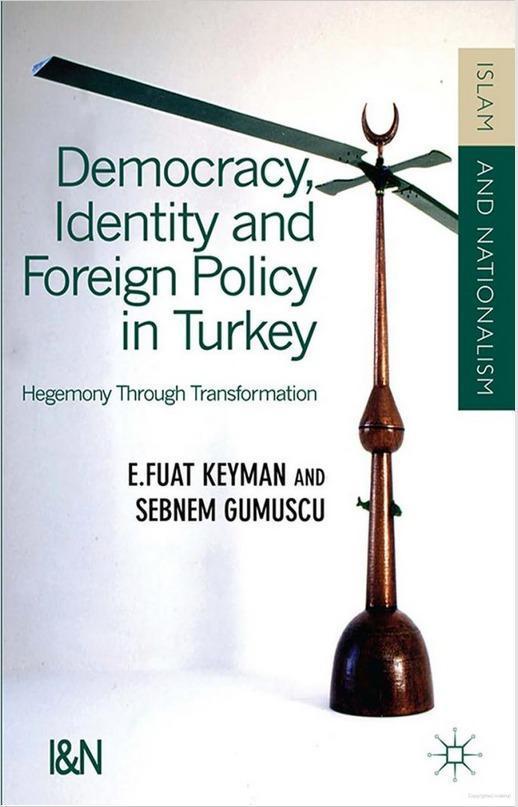Democracy, identity and foreign policy in Turkey
William Armstrong - william.armstrong@hdn.com.tr

DAILY NEWS Photo
‘Democracy, Identity and Foreign Policy in Turkey: Hegemony Through Transformation’ by Fuat Keyman and Şebnem Gümüşçü (Palgrave Macmillan, $95, 224 pages)After 12 years of Justice and Development Party (AKP) rule, plenty of earnest ruminations have been written about the direction of Turkey’s democracy. These 10 chapters co-written by Turkish academics Fuat Keyman and Şebnem Gümüşçü share the variable quality of most reflections on the issue, oscillating between the insightful and the confused. The two authors, both at Sabancı University’s Istanbul Policy Center, are doves when it comes to the AKP, taking the long view and generally subscribing to a “two-stage” reading of its time in power: The party started out as a genuinely conservative-democratic force restrained from its Islamist inclinations by a host of external factors, but has since exploited and exacerbated Turkey’s lack of checks and balances to establish itself in uncontestable power at the center of the state. That’s a defendable position, but the arguments in this book generally fail to weigh Turkey’s (un)democratic crisis heavily enough. As a result, Keyman and Gümüşçü have some crucial blind spots that often leave their book feeling rather thin.
 The authors frame Turkey’s “transformation” in terms of the international context since the end of the Cold War. The demise of the Soviet Union, they write, “significantly increased the momentum of globalization and allowed for greater space and opportunity for identity politics with the demise of the bipolar world.” The end of Turkey’s “buffer state” foreign policy identity” encouraged it to search for a new identity, both internationally and domestically, and the authors have much to say about this search - expressed variously through Islamism, Kurdish nationalism, or recalcitrant Turkish nationalism. But there are some contradictions in what they write. In fact, they actually criticize what they argue is a shallow overemphasis on “identity” that lies at the center of most mainstream political debate today, saying it is “essential to move beyond this debate on identity and focus on power dynamics instead.” This sets up a false dichotomy - as if power dynamics aren’t intimately related to group identities in Turkey.
The authors frame Turkey’s “transformation” in terms of the international context since the end of the Cold War. The demise of the Soviet Union, they write, “significantly increased the momentum of globalization and allowed for greater space and opportunity for identity politics with the demise of the bipolar world.” The end of Turkey’s “buffer state” foreign policy identity” encouraged it to search for a new identity, both internationally and domestically, and the authors have much to say about this search - expressed variously through Islamism, Kurdish nationalism, or recalcitrant Turkish nationalism. But there are some contradictions in what they write. In fact, they actually criticize what they argue is a shallow overemphasis on “identity” that lies at the center of most mainstream political debate today, saying it is “essential to move beyond this debate on identity and focus on power dynamics instead.” This sets up a false dichotomy - as if power dynamics aren’t intimately related to group identities in Turkey.The book’s failure to offer any sustained economic perspective on modern Turkey is an even bigger drawback, hollowing out much of the rest of the book. While the authors write at length about the dangers posed by the AKP’s hegemonic consolidation over its 12 years in government, there’s precious little about how the party has exploited economic patronage networks to reinforce its position at the top of the state. The book subscribes to the popular fiction that the AKP is an economically liberal party at its core, when it has become increasingly clear that liberalism only extends as far as it reinforces the party in power. As described in Ayşe Buğra and Osman Savaşkan’s excellent recent book, “New Capitalism in Turkey: The Relationship between Politics, Religion and Business” the AKP has in fact made use of a highly illiberal crony capitalist model, mobilizing the state to entrench itself in power and reward friendly business groups. The process may well have been dynamic, but it certainly has little to do with liberalism.
Nevertheless, there are still some useful things to take away from Keyman and Gümüşçü’s book. Every chapter is informed by Turkish sociologist Şerif Mardin’s seminal center-periphery thesis, which introduced a simple but enduring theory of society from the Ottoman to the Turkish republican periods. Instead of a reductive top-down analyses of Turkish modernization of religion vs. secularism, Mardin focused on the center-periphery cleavage, in which the state-networked modernizing urban center was in constant tension with the rural periphery, with the latter constantly trying to defend its de facto autonomy. The failure to entirely integrate the center with the periphery is one of Turkey’s enduring challenges, but Mardin’s thesis is now reaching some interesting limits: The cultural division may persist, but the true “hegemonic transformation” of the current AKP government is its consolidation of the periphery at the center. The persistence of the center-periphery dichotemy has always been seen as emblematic of Turkey’s democratic troubles, but now the country is moving beyond it a whole new set of problems has emerged.










